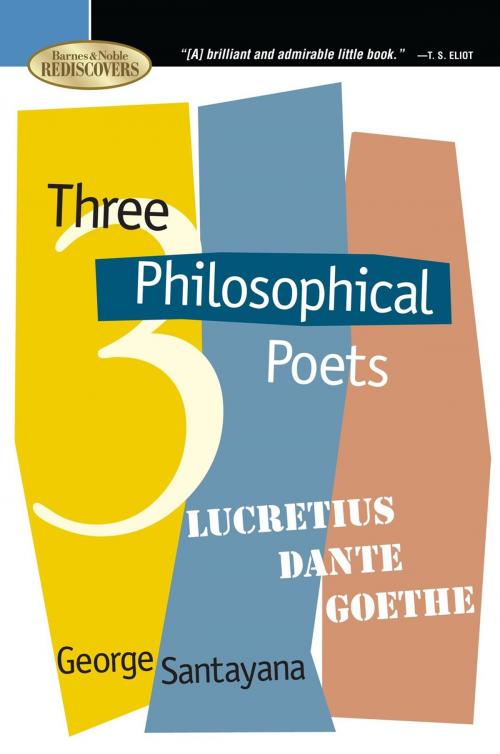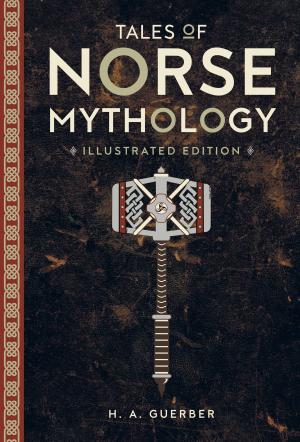Three Philosophical Poets
Lucretius, Dante, Goethe
Nonfiction, Religion & Spirituality, Philosophy, Aesthetics| Author: | George Santayana | ISBN: | 9781435142237 |
| Publisher: | Fall River Press | Publication: | April 16, 2012 |
| Imprint: | Fall River Press | Language: | English |
| Author: | George Santayana |
| ISBN: | 9781435142237 |
| Publisher: | Fall River Press |
| Publication: | April 16, 2012 |
| Imprint: | Fall River Press |
| Language: | English |
“I am no specialist in the study of Lucretius; I am not a Dante scholar nor a Goethe scholar….My excuse for writing about them, notwithstanding, is merely the human excuse which every new poet has for writing about the spring. They have attracted me; they have moved me to reflection; they have revealed to me certain aspects of nature and of philosophy which I am prompted by mere sincerity to express, if anybody seems interested or willing to listen.”
The modesty exhibited in the above disclaimer—from Santayana’s preface to Three Philosophical Poets—should be viewed in the context of the author’s extraordinary impact as a philosopher and teacher. The Sense of Beauty has claim to being the first major work on aesthetics written in the United States; the multivolume The Life of Reason is arguably the first extended analysis of pragmatism anywhere. Among Santayana’s many well-known Harvard students, Wallace Stevens has acknowledged a clear debt to his work.
Based on a course Santayana taught at Harvard, Three Philosophical Poets was first delivered to the public as a series of lectures at Columbia University in 1910. Santayana’s lifelong, learned meditation on the relationship between philosophy and art is apparent. (Santayana’s own prose style has long been considered among the most eloquent in all of philosophy.) Here, he discusses the chief phases of European philosophy—naturalism, supernaturalism, and romanticism—as they are set forth and epitomized by the works of Lucretius, Dante, and Goethe, respectively.
“[A] brilliant and admirable little book.”
—T. S. Eliot
“The exquisite and memorable way in which he has always said things has given so much delight that we accept what he says as we accept our own civilization. His pages are part of the douceur de vivre.”
—Wallace Stevens
“Santayana was the real excitement for me at Harvard, especially Three Philosophical Poets….It really fixed my view of what poetry should ultimately be.”
—Conrad Aiken
“I am no specialist in the study of Lucretius; I am not a Dante scholar nor a Goethe scholar….My excuse for writing about them, notwithstanding, is merely the human excuse which every new poet has for writing about the spring. They have attracted me; they have moved me to reflection; they have revealed to me certain aspects of nature and of philosophy which I am prompted by mere sincerity to express, if anybody seems interested or willing to listen.”
The modesty exhibited in the above disclaimer—from Santayana’s preface to Three Philosophical Poets—should be viewed in the context of the author’s extraordinary impact as a philosopher and teacher. The Sense of Beauty has claim to being the first major work on aesthetics written in the United States; the multivolume The Life of Reason is arguably the first extended analysis of pragmatism anywhere. Among Santayana’s many well-known Harvard students, Wallace Stevens has acknowledged a clear debt to his work.
Based on a course Santayana taught at Harvard, Three Philosophical Poets was first delivered to the public as a series of lectures at Columbia University in 1910. Santayana’s lifelong, learned meditation on the relationship between philosophy and art is apparent. (Santayana’s own prose style has long been considered among the most eloquent in all of philosophy.) Here, he discusses the chief phases of European philosophy—naturalism, supernaturalism, and romanticism—as they are set forth and epitomized by the works of Lucretius, Dante, and Goethe, respectively.
“[A] brilliant and admirable little book.”
—T. S. Eliot
“The exquisite and memorable way in which he has always said things has given so much delight that we accept what he says as we accept our own civilization. His pages are part of the douceur de vivre.”
—Wallace Stevens
“Santayana was the real excitement for me at Harvard, especially Three Philosophical Poets….It really fixed my view of what poetry should ultimately be.”
—Conrad Aiken















